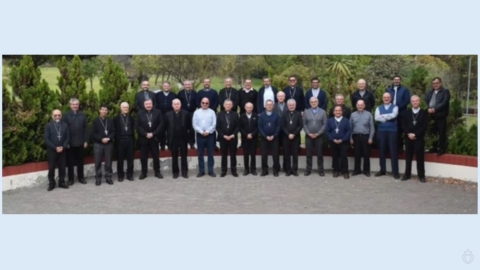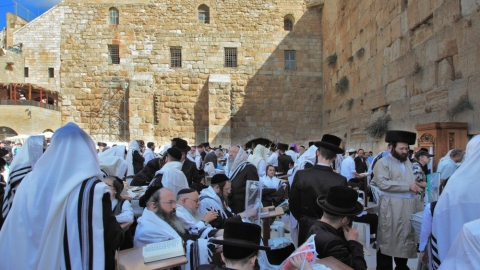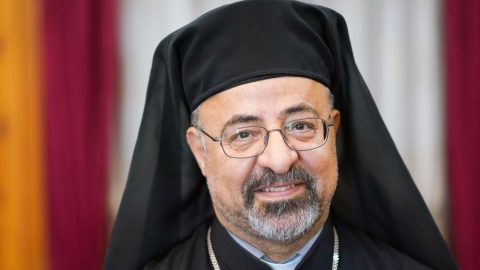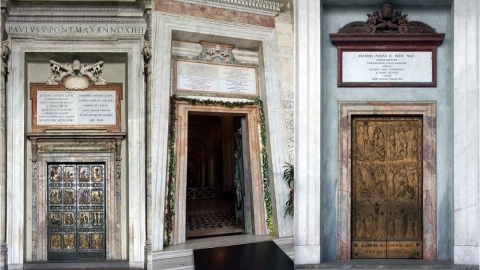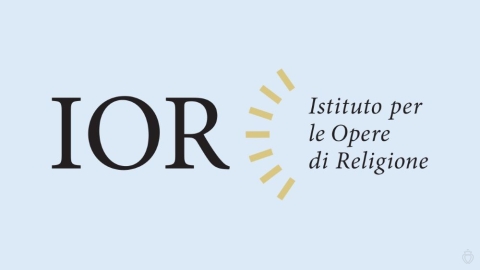Switzerland: President of the Catholic Women's League Divinizes the Earth

Mrs. Simone Curau-Aepli and Bishop Josef Stübli
The SKF, Swiss League of Catholic Women, has 120,000 members, 17 cantonal associations, and 600 local associations. It is the largest denominational umbrella association for women in Switzerland. SKF is committed to the rights of all women in society, church, business, and politics. It receives grants from the Swiss Bishops' Conference (CES).
Its president Simone Curau-Aepli recently gave an interview to the kath.ch site, in view of the climate law to be voted on in Switzerland on June 18. Her convictions about "Mother Earth" recall the encyclical Laudato si', but are far from the Catholic Faith.
Mrs. Curau-Aepli first expresses the urgency of a climate law for Switzerland. This commitment to the climate, she says, “is part of our identity as SKF. In our charter, the preservation of creation is one of our principles of action.”
“Preserving creation,” she explains, “is not understood by everyone. Those who are not close to religious traditions understand creation as the mythical process of producing the world. On the other hand, by creation we mean everything that is created and is always created: nature, the environment.”
The SKF president then explains the relationship between the climate issue and faith. She makes it clear that she is giving her personal opinion. “I think it is essential that we Christians find another understanding of creation.”
“One of the reasons why our world and our climate are in this problematic state is because we only name the divine in heaven – Jesus, who became man, and the Holy Spirit, who is not in a place – and we love that. But we have forgotten Mother Earth in our tradition.”
Mrs. Curau-Aepli continues: “It is unfortunately true. Do you know of any prayers or rituals that honor this god [perhaps we should write “God”?] who is Mother Earth? However, there have always been Christian prophets – like Hildegard von Bingen, Francis of Assisi, or Dorothee Sölle – who encountered God directly in nature and invoked it as divine. But they failed to introduce it into the doctrine.”
The journalist then asks for an explanation. Not disconcerted for a minute, the improvised theologian replies: “I am convinced that it is because we Christians understand the earth as something created, but not something divine in itself, that we have thought until now that we can simply use and exploit the land - according to our needs or our greed.”
“I think the Earth would be in a much better state if we recognized Mother Earth as the divine source from which we were created. And to which we return. We would behave more respectfully towards the Earth.”
After such a statement, Mrs. Curau-Aepli adds: “We are a faith-based association and we take positions on current issues on behalf of our members. In doing so, we also defend positions that diverge from those of the official Church, for example on questions of bioethics. On the subject of the climate, however, we are – I am sure – in agreement with many people in the leadership of the Church.”
No one should be surprised, these flights of fancy are not new, pantheism has professed them in various forms and at various times of humanity, and it had even somewhat infiltrated among certain theologians of the 19th century, initially causing Pius IX’s reaction in his Syllabus.
The First Vatican Council in turn intervened with the Dogmatic Constitution Dei filius of April 24, 1870 in Canon I, to which must be added §§ 3, 4, and 5 which carry explicit anathemas. Section 4 says thus: “If anyone says that finite things, both corporal and spiritual. . . emanated from the divine substance, let him be anathema,” [Si quis dixerit, res finitas, tum corporeas tum spirituales,. . . e divina substantia emanasse. . . anathema sit.”], which is what Mrs. Curau-Aepli is saying equivalently.
Saying that the earth is divine, and that it is “the divine source from which we were created,” is to claim a real divinity for the earth, however this divinity is conceived. To say that it takes prayers to honor the earth is yet another way of claiming it.
The president of the Swiss League of Catholic Women has therefore clearly fallen into the grossest heresy. Without knowing her exact thoughts – which are probably very confused – her words express a condemned doctrine.
It is unfortunately likely that such wanderings germinated on a soil which was much prepared by the encyclical Laudato si', and that the seed was sown during the Amazon Synod.
(Sources : kath.ch/Valli – FSSPX.Actualités)
illustration : Facebook / SKF Schweizerischer Katholischer Frauenbund
